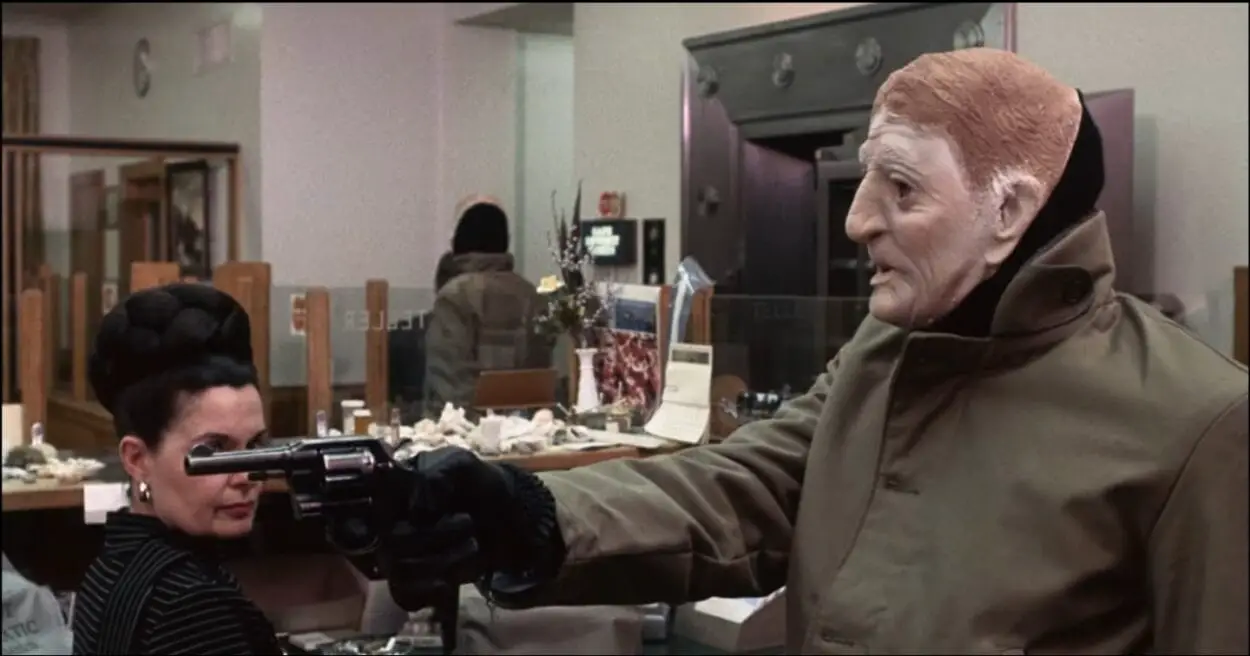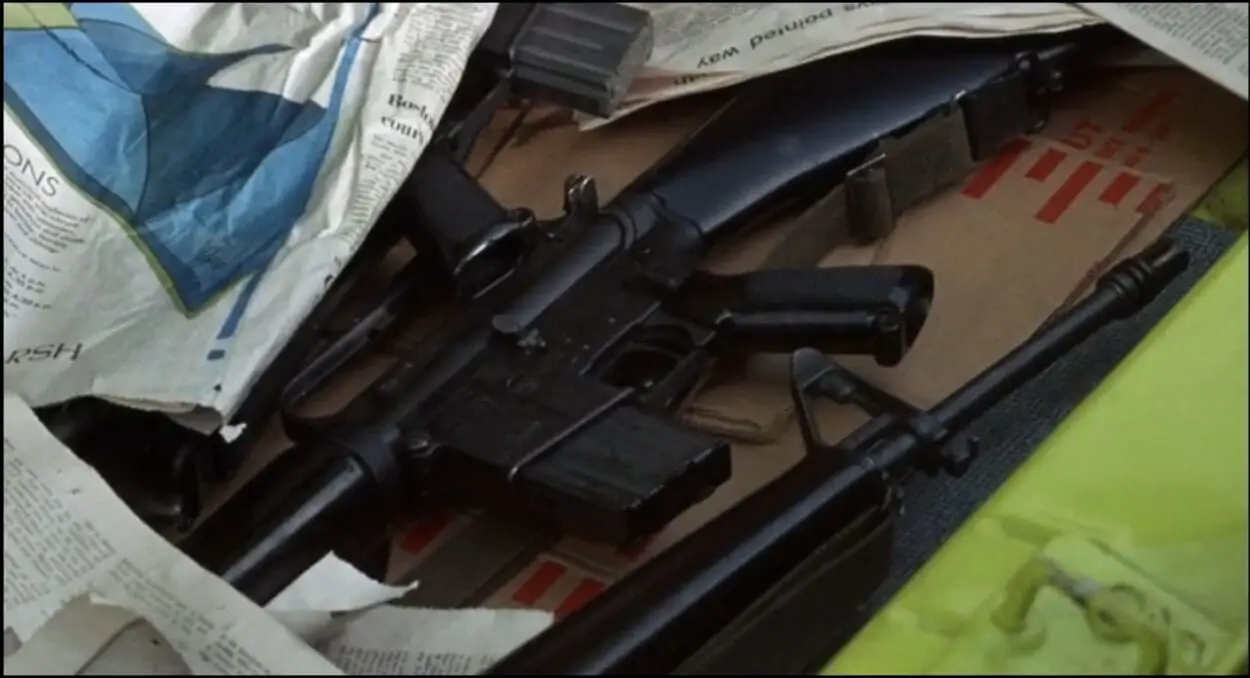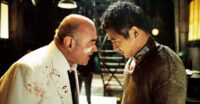The gangster or criminal is an iconic character archetype throughout the history of both fictional and non-fictional media in America. Whether the cigar smoking and Tommy gun wielding gangsters of the 1930s and 1940s, the elaborate mafia families of the 1970s, or the glamorous drug-dealing and white suit-wearing criminal figures of the 1980s, the image of the criminal in American cinema has evolved throughout the decades. However, the crime genre went through a phase of near social realism during the 1970s with the massive success of grimy and almost documentarian detective crime films like The French Connection (1971).
Within this crime genre trend of the 1970s, law enforcement became more questionable in their often code violating and extrajudicial methods—the criminals themselves became less a symbol of championing for the citizens kept under oppressive federal systems, and were instead worried about their own success and maintained relationships through intimidating potential informants or witnesses from speaking out. In Peter Yates’s moody and dingy crime film The Friends of Eddie Coyle (1973), Yates condemns the criminal lifestyle through the experiences of weaker criminal members trying to maintain a sense of control in a threatening environment.
The film centers around the titular Eddie Coyle (Robert Mitchum), an older, working–class truck driver and criminal gunrunner with a wife and multiple kids, as he awaits a trial for involvement in a truck hijacking set up by Dillon (Peter Boyle) a close friend who owns the bar where Coyle drinks. As Coyle awaits his trial, ATF agent Dave Foley (Richard Jordan) presses him to become an informant so the judge will grant leniency towards his case and reduce or revoke likely jail time. This main character perspective of an older family man is a rare take within the crime genre, whose protagonists are typically youthful men with no familial responsibility and little to lose with jail time. Eddie Coyle doesn’t have that luxury as his life expectancy is decreased from an older age, and being away from his children would cause vast troubles as he wouldn’t be able to support his family financially or emotionally.
This relationship between Coyle and Foley is also intriguing as it places the main criminal character in a state of being easily being restrained. Despite the crime genre celebrating or highlighting independence against any authority forces, Coyle cannot afford resistance due to his family life and the small number of years alive he has left. With Coyle being pressured by Dillon, a gang of masked and armed bank robbers led by Jimmy Scalise (Alex Rocco) and Arty Van (Joe Santos) goes through Boston neighborhoods and robs multiple banks while taking hostages. The robbers, who use Coyle as a supplier for their weapons, require more for future bank robberies.
Coyle then meets another gun runner named Jackie Brown (Steven Keats) and organizes a deal to get weapons from him for Scalise and Van’s gang, despite Brown’s insistent bargaining. The business relationship between Coyle and Brown is a great visual and thematic duo as the older and more experienced Coyle emphasizes the necessity of having specific weapons for his clients, while Brown is much more impatient both vocally and physically at the negotiating table, exposing the drastic difference in their age groups. Furthermore, Peter Yates makes the meeting more engaging in its public environment with a lack of an intrusive film score, drawing the audience into the tense verbal conversation between actors Mitchum and Keats.
Another moment that highlights the drastically different mannerisms between Brown and Coyle is when Brown is able to sell the guns Coyle needs in a supermarket parking lot, with the older Coyle being startled by the presence of numerous assault rifles underneath the pistols in Brown’s trunk, while Brown sees his weapon stockpile as an achievement. Yates utilizes this sequence to further reinforce Coyle’s apprehension in being caught in a worse situation by federal law because of his precarious situation with the upcoming trial, while Brown’s disinterest in remaining inconspicuous in a public setting brings tension through the audience’s understanding of the consequences that will occur if they’re seen dealing weapons. This meeting also underlined the heavy presence of crime throughout the Boston environment in the film as crimes are committed in calm public environments along with the tense and numerous armed robberies throughout the film.

Throughout the film, agent Foley highlights the weakened status of low-level criminals in the relationship between federal law enforcement, and those like Coyle, with Foley’s consistent pressuring of Coyle to provide information—the decision to become informants is a difficult task for those criminals with families or loved ones that could be harmed if they’re discovered working with the law. Yates makes these meetings between Coyle and Foley attention-grabbing by having both of them in close proximity to each other whenever they meet, allowing a visual example of the law’s eagerness to limit their criminal suspects freedoms.
These constant conversation scenes also reinforce Coyle’s lack of control over his life as Foley is able to nearly blackmail him to advance the agent’s position as an effective agent, while Coyle deals with more dangerous consequences if he helps him, with no strong guarantee that a judge would acquit him of his trial anyway. Further in the film, Coyle decides to inform Foley and the ATF of Jackie Brown’s assault rifle stockpile, leading to his arrest, but Foley tells Coyle that it isn’t enough to lower his chances of the upcoming case. This moment is a momentous revelation that federal law enforcement has the power to decide when a criminal is worthy of having reduced cases, despite their aid, as they label it as small information despite the risk that Coyle took in allowing his dealer to be arrested. Yates is also able to showcase the power of the federal government as they outgun and out–man Jackie tenfold when they capture him, showcasing the contradiction of Foley’s statement as their “unimportant” arrest required the aid of numerous armed lawmen to be able to apprehend Brown.

When Coyle eventually decides to inform Foley and the ATF of Scalise’s and Arty Van’s gang, he’s informed that they’ve been already been caught (through Dillon being an informant unbeknownst to Coyle) and that the upcoming trial will still occur for Coyle. With the gang’s arrest, the blame is placed on Coyle already before Dillon blames him to the local crime head, who pays Dillon to kill Coyle. As Dillon persuades Coyle to a hockey game and gets him drunk, Coyle states that the hockey player Bobby Orr has a bright future ahead of him before he is killed on the car ride home by Dillon’s accomplice. This moment highlights the tragic nature if Coyle’s character as the law led him on to becoming an informant, and when he gives them information too late, they discard him without accounting for the value of Brown’s arrest, leaving him to the dark fate of a prison sentence at his old age. Yates also makes the situation tragic through having Coyle killed in the quiet and dark environment of a car ride away from the stadium in his drunken sleep, not affording him the chance to fight back or get away from his fate as a low-level criminal in the targets of more powerful figures.
While Coyle states that Orr has a future, this is a prospect he doesn’t have himself, being killed and discarded in the shadows without anyone to care for him besides his unaware family, a fate that is a harsh reality for most lower-level criminals, and not the guns blazing shootout of glory with which most crime films culminate.




Check out the exclusive one on one interview I scored with Alex Rocco who played Jimmy Scalise in TFoEC. It was part of a larger tribute project to this wonderful film and George V. Higgins novel. Hope you enjoy! https://www.youtube.com/watch?v=W2TACnP1jk4&list=PL8171861DD8577ACA
This is the film that Tarantino wishes he could’ve made.
Thanks! For bringing to light one of my favorite films of the 70’s,”The Friends of Eddie Coyle” This is Robert Mitchum at the top of his game, a truly GREAT performance. The supporting cast is stellar, every role perfectly cast. From the above mentioned Peter Boyle, Steven Keats, Richard Jordan (who damn near steals the movie) to Mitch Ryan, Jack Kehoe and James Tolkan. And yeah, being from Boston, LOVE that Numbah Four Bobby Orr is featured in this. Peter Yates did a wicked pissah job of directing this underrated gem.
1973 was also the year that another of my favorites was released, Martin Scorsese’s “Mean Streets”. These two movies would be a very COOL Old School Double Bill. HIGHLY RECOMMEND. Thanks, again.